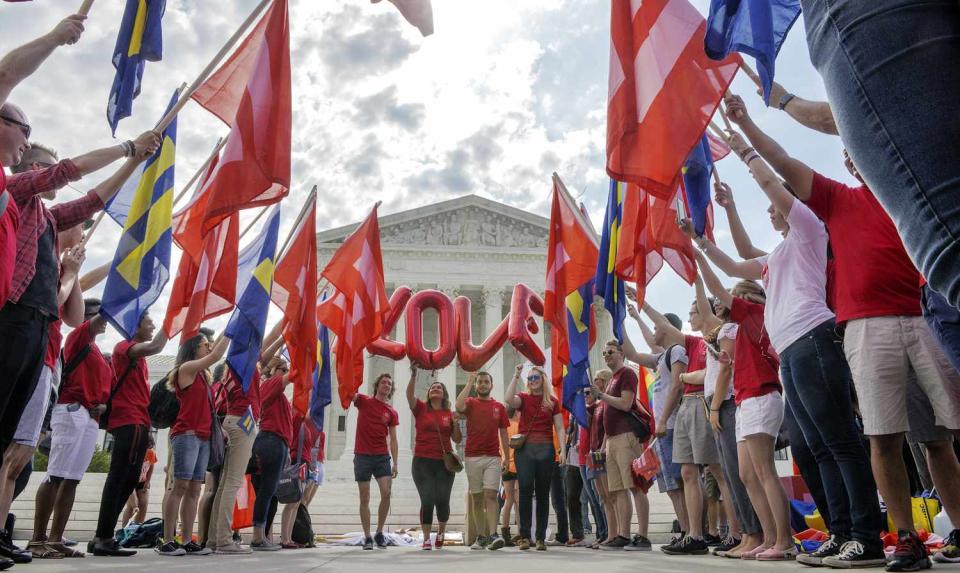Senate Passes Respect for Marriage Act with 12 Republicans Joining to Ensure Same-Sex Marriage Protections

- Oops!Something went wrong.Please try again later.
AP Photo/Jacquelyn Martin
The U.S. Senate has passed the Respect for Marriage Act, a congressional attempt at permanently protecting the right to same-sex marriage.
Senate Majority Leader Chuck Schumer brought the measure to the floor after a bipartisan group of lawmakers determined they had the votes.
The bill, after it is signed into law by President Joe Biden, will repeal the Defense of Marriage Act, a 1996 law that said the federal government will not recognize any same-sex marriages performed by states.
While currently unenforceable thanks to landmark Supreme Court decisions United States v. Windsor and Obergefell v. Hodges, DOMA still exists on paper, meaning it could be reinstated if those rulings were overturned by the Supreme Court's conservative stronghold.
Some have suggested that the court's decision to overturn Roe v. Wade paves a path to target same-sex relationships — a theory that has seemingly been backed up by one justice himself.
For more on this story, listen below to our daily podcast PEOPLE Every Day.
In a concurring opinion on the Roe case, Justice Clarence Thomas wrote that the Supreme Court should reconsider Griswold v. Connecticut, Lawrence v. Texas, and Obergefell v. Hodges — the rulings that currently protect the right to buy and use contraceptives without government restriction, the right to a same-sex relationship, and the right to same-sex marriage.
From Thomas' concurring opinion: "... in future cases, we should reconsider all of this Court's substantive due process precedents, including Griswold, Lawrence, and Obergefell. Because any substantive due process decision is 'demonstrably erroneous,' ... we have a duty to 'correct the error' established in those precedents..."
Despite the conservative justice's opinion, national polls show record-high support for marriage equality.
"The support for marriage equality is so consistent across poll after poll after poll," David Stacy, government affairs director for the Human Rights Campaign, told PEOPLE in an earlier interview. "The numbers are ticking up and they're sticking."
RELATED: What to Know About the 'Respect for Marriage Act' as D.C. Lawmakers Rush to Codify Same-Sex Marriage

Bill O'Leary/The Washington Post via Getty Supporters of same-sex marriage await the groundbreaking Supreme Court ruling
In July, the House passed RFMA in a 267-157 vote, with 47 Republican representatives joining Democrats in defending marriage equality.
On Tuesday, 12 Republicans joined Democrats in passing the bill in the Senate, including Sen. Thom Tillis of North Carolina, Sen. Susan Collins of Maine, Sen. Rob Portman of Ohio, Sen. Richard Burr of North Carolina, Sen. Todd Young of Indiana, Sen. Shelley Moore Capito of West Virginia, Sen. Mitt Romney of Utah, Sen. Joni Ernst of Iowa, Sen. Roy Blunt of Missouri, Sen. Cynthia Lummis of Wyoming as well as Senators Lisa Murkowski and Dan Sullivan of Alaska, according to the Associated Press.
Other Republicans noted their stance against the bill early on, with Florida Republican Marco Rubio, telling CNN reporter Manu Raju it was "a stupid waste of time" earlier this year.
Because the Senate made some minor tweaks to the bill in order to get Republicans' support, the new RFMA language will need to be reapproved by the House before Biden signs it into law. House Majority Leader Steny Hoyer announced Tuesday that he plans to hold a vote on the amended bill as early as Dec. 6.
Never miss a story — sign up for PEOPLE's free daily newsletter to stay up-to-date on the best of what PEOPLE has to offer.
Even when DOMA becomes law, it will not be able to require state governments to issue marriage licenses to same-sex couples or grant them state-level marriage benefits, as states have the ultimate authority over marriage benefits, second only to the Supreme Court.
What would the bill could do, according to language released this week, is "require the federal government to recognize a marriage between two individuals if the marriage was valid in the state where it was performed" and "guarantee that valid marriages between two individuals are given full faith and credit, regardless of the couple's sex, race, ethnicity, or national origin."

